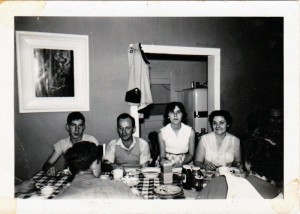Many people gather friends and family over the holidays. Everybody we care about is in the room! It’s a great time to have conversations that may feel uncomfortable but are extremely important in a health care crisis – Health Care Directives, End-of-Life wishes and concerns, just to name a few. After all, our friends and family are the ones we hope will be around assisting us with our needs, and they need to know what we care about so they can offer personalized care and comfort when we are unable to communicate ourselves.
As I’ve mentioned before, communication is the key to having control over your treatment at the end of your life. Think about those things you care about most. Now think how few people actually understand what those wishes and concerns are because you don’t tend to discuss them. And, although there are some holiday gatherings that would be inappropriate for such conversations, use the opportunity when at all possible. The more each family member understands where you’re coming from, the better everyone can assist in a helpful way in your care when it’s time. And, they will understand what’s important to you, which, don’t forget, can be of profound importance to those who you leave behind. Also, consider that more intimate conversations in small groups are commonly better than one large conversation over the turkey dinner at the table!
Here are three possible “ice-breakers” to start a conversation about what matters to you most at the end-of-your life (tailor them to your unique circumstances and personalities):
- “I sure miss ________ at our family celebrations! When s/he passed away, I felt so helpless not knowing anything about what was important to him/her at the end. What’s important for me to know about you/mom/dad (whomever) so that doesn’t happen to us?” OR…..
- “I’m pleased to have finally completed my Health Care Directive, something I’ve been putting off for awhile, and I named mom/dad/whomever as my agent. Do you have one?” OR…..
- “Did you hear the _______family just lost _________? It was so hard to see them fighting over what should happen when their mom/dad went into hospice care – especially for mom/dad. Can we at least start a conversation today about what’s important to you/mom/dad (whomever) so that doesn’t happen to us? It seems so much easier to talk about it now before there’s a crisis.”
Remember, not everyone responds to conversations like these in the same way, and it’s wise to select your conversation participants wisely before dipping your toe into the water. But, you know it’s true that these conversations are easier and less stressful when there’s not a crisis at hand. And, even if some of the family is uncomfortable, you can try to keep the conversation focused on opportunities to serve each other as friends and family in an emotionally challenging situation, or on the fact that you’re interested in addressing the exercise of personal choice and unique concerns – something most people would like to address with people they know well and love.
Use your own instinct to guide you with your friends and family. But, don’t let the conversation opportunity slip by – if not now, then figure out when might be a better time.
This blog is written by Bridget-Michaele Reischl, Attorney DECORO LAW OFFICE, PLLC www.decorolaw.comALL READERS: This blog is not, nor shall it be deemed to be, legal advice or counsel. This blog does not create an attorney-client relationship with any reader. It is designed to encourage thoughtful consideration of important legal issues with the expectation that readers will seek professional advice from a licensed attorney.
Contact Bridget-Michaele Reischl at: DECORO LAW OFFICE, PLLC 6 West 5th Street, Suite 800-D Saint Paul, MN 55102 (651)-321-3058

